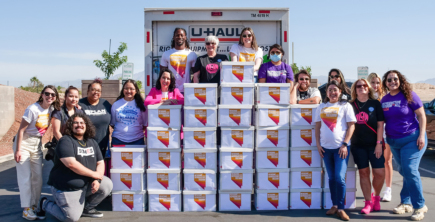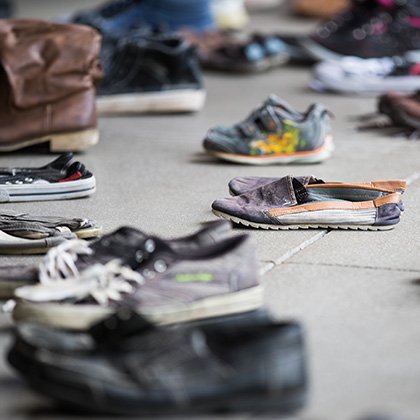
Our Community

Each pair represents the story of an immigrant or refugee. Grantmakers Concerned with Immigrants and Refugees (GCIR) conference.
While millions are affected real-time by rapid changes in local, state, and federal immigration policy, the Tides team has been engaging stakeholders across the immigrant community. Roxana Shirkhoda, Tides director of strategic initiatives, attended the Grantmakers Concerned with Immigrants and Refugees (GCIR) convening in Los Angeles to connect with other funders, philanthropists, and changemakers working right now in this critical issue area. Here Roxana shares her impressions and experience about the event and the growing movement.
Our 2018 convening was an opportunity to gather with local, state, and national foundations with diverse interests to discuss emerging challenges and opportunities for newcomers and receiving communities. Running from February 27 through March 1, 2018, the conference explored a wide range of issues facing immigrants and refugees at this critical juncture—and how diverse grant-makers across the country are responding. Participants considered the promising practices, strategies, and approaches being pursued in the field and in philanthropy. -GCIR
While this was Tides’ first year participating in the GCIR convening, we are proud of our longstanding support of immigrant communities, including our current partnerships with Detention Watch Network, Lacuna Giving Circle, Arab Resource & Organizing Center (AROC), Multifaith Alliance for Syrian Refugees, Pro Bono Net/Immigration Advocates Network, and many more. It was important that we be at the table with like-minded leaders in the community to discuss ways we can collectively be more informed on the issue area, as well as ways we can together lift up the work of movement builders on the ground. We value forming collaborations that meaningfully leverage the resources of our donor community.
In the coming year, we are deepening our commitment in the immigration space by bridging the gap between unlikely partners across sectors, with a focus on the talented technological community. We intend to utilize Tides’ expansive network of funders, corporate partners, nonprofit organizations, and issue area experts to facilitate partnerships among diverse collaborators. We know that we can be smarter and achieve more by working together than we can alone.

Spoken word artist Vanessa Tahay. Grantmakers Concerned with Immigrants and Refugees (GCIR) conference.
This convening was incredibly unique because GCIR brought together both funders and grassroots leaders to address the state of emergency facing immigrants, refugees, and asylum seekers in the U.S. Event participants who work day and night in the trenches were intentional and deliberate in their clear calls to action – particularly encouraging the funder community to act with a fierce sense of urgency to help the millions of families, communities, and businesses impacted by changes in immigration policy.
Worth noting, this gathering was by far the most welcoming group of practitioners in any field I have experienced. With no ego in the room as to funder reputation or assets under management, folks were keen to build on one another’s expertise and past experiences to establish partnerships to support the immigrant community in tandem.
While there are many moving parts amid the immigrant landscape, these are some of the most critical within the U.S:
Philanthropy has a critical role to play in this highly volatile environment with access to resources that can address increasingly complex issues.

Each pair represents the story of an immigrant or refugee. (GCIR)
Two themes that emerged at GCIR were around urgency and trust:
Three additional takeaways for everyone to keep in mind when engaging within the immigrant movement:

Timeline, Grantmakers Concerned with Immigrants and Refugees (GCIR) conference.
This incredibly challenging work can only move forward if funders, movement builders, law enforcement, corporations, policy makers, and others unite around a common goal of promoting humanity, dignity, and equal protection for vulnerable immigrant lives currently under threat.

Roxana Shirkhoda is the Director of Special Initiatives at Tides, where she helps our partners come together to create daring change.
For more on Tides work with immigration justice, see our Q & A with Tides Senior Advisor Alex Rojas: Abriendo Puertas with Our Values and Voice or Daring Change in Action: A Conversation with Andrea Granda.

Our Community

Crisis Response Fund

Crisis Response Fund

Read the stories and hear the voices of social change leaders fighting for justice.